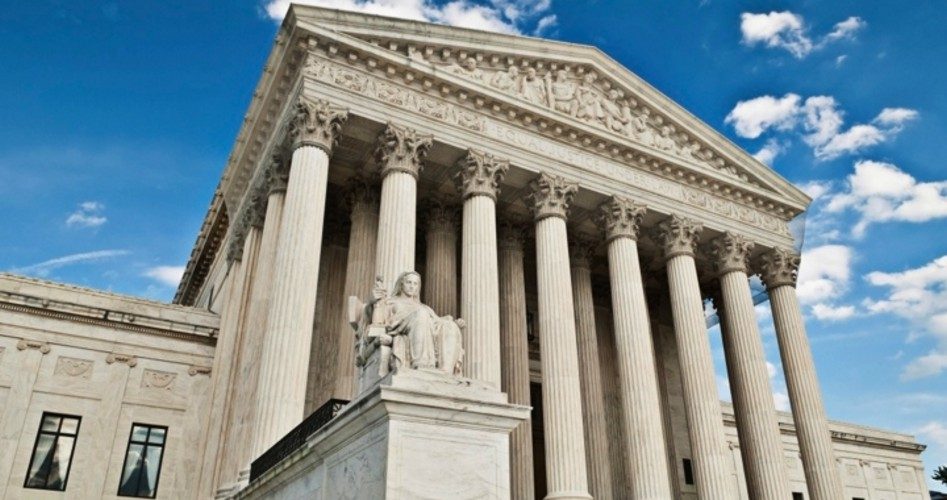
In agreeing to take the Justice Department’s challenge to a circuit court ruling temporarily blocking the president’s decision to defer the deportations of millions of illegal immigrants, the Supreme Court has signaled that it will also consider whether Obama violated the “take care” clause of the Constitution, which states that “[the president] shall take care that the laws are faithfully executed.”
Why did the Framers of the Constitution include that clause, found in Article II, Section 3 of the nation’s “supreme law,” and what does it mean? A little history is in order.
In 1688, the English Parliament ousted King James II in a bloodless rebellion known to history as “the Glorious Revolution.” A principal cause of that revolt was the king’s obstinate decision to not enforce all the laws enacted by the legislative branch.
It is hard to imagine that America’s Founders intended to give the president a power that Parliament had stripped from the king of England. Even before the Constitution was written in 1787, New York’s state constitution used the language that its governor was required to take care to faithfully execute the laws. This ties the words used in the U.S. Constitution even more closely with the English bill of rights of 1689. Before James II was king of England, he was the duke of York, and his brother, King Charles II, had given him the land which had belonged to the Dutch before the Anglo-Dutch War. After England defeated the Netherlands, the Dutch colony of New Netherlands was renamed New York, after the king’s younger brother. James’ rule of New York resulted in widespread resentment, as he refused to even recognize the basic rights of Englishmen — including the right of the colonists to determine their own rate of taxation (“no taxation without representation”).
{modulepos inner_text_ad}
This made a permanent impression on the political leaders in New York, and their historical experience with a lawless executive led to the inclusion of the phrase “he shall take care that the laws be faithfully executed” in the Constitution of the United States, just as the English bill of rights had included the phrase “laws should not be dispensed with or suspended without the consent of Parliament.”
James Wilson, considered a major contributor at America’s Constitutional Convention in the creation of the office of the presidency, later explained that the “take care” clause involved the president’s “authority not to make, or alter, or dispense with the laws, but to execute and act the laws.”
This goes to the heart of the dispute between Obama and the Congress. Congress, over the years, has enacted certain immigration laws and declined to enact other immigration laws as desired by this president, as well as his Republican predecessor, George W. Bush. Obama has chosen to exercise “executive discretion,” and defer the deportation of approximately four million illegal immigrants. Those opposed to his policy contend that Obama is not really exercising executive “discretion,” but rather is ignoring the law, and creating law on his own.
The present dispute arose out of Obama’s decision to defer deportation of the illegals, following the failure of the so-called DREAM Act to pass, as the president had demanded. He declared in June of 2012, “I have said time and time again to Congress that, send me the DREAM Act, put it on my desk, and I will sign it right away. In the absence of any immigration action from Congress to fix our broken immigration system, what we’ve tried to do is focus our immigration enforcement resources in the right places.”
Frustrated at the continued failure of Congress to liberalize immigration law to his liking, and its reluctance to provide some sort of amnesty for the millions of illegal aliens brought to the United States as small children by their parents, Obama eventually just issued an executive order to federal law enforcement that millions of those in this “class” would not be deported.
Texas and 25 other states challenged Obama’s actions before federal judge Andrew Hanen in Brownsville, Texas, and Hanen issued a temporary order blocking the action of the Obama administration, contending that the executive branch had not followed the rules set out by the Administrative Procedures Act. Subsequently, the 5th Circuit Court of Appeals upheld the decision of the district court, after which the Obama administration appealed to the Supreme Court.
It was the Supreme Court itself which raised the constitutional question of whether the president had violated the “take care” clause.
Some have compared the executive discretion held by the president to that held by prosecutors, who do not prosecute every single case, for a multitude of reasons. Sometimes law enforcement has only limited resources; other times the exact meaning of the law as it applies in a particular case is not clear. Exercising such discretion in individual cases, however, is quite different from using discretion to alter the law itself.
Associate Supreme Court Justice Antonin Scalia explained it this way, in a 2014 court case: “The power of executing the laws necessarily includes both authority and responsibility to resolve some questions left open by Congress that arise during the law’s administration. But it does not include a power to revise clear statutory terms that turn out not to work in practice.”
Randy Barnett, who was the lead lawyer for the National Federation of Independent Business (NFIB) in their challenge of the Affordable Care Act (ObamaCare), explained the concept in the context of a contract. “What distinguishes good faith from bad faith performance of a contract is not the exercise of discretion but is the motive or purpose for which discretion is exercised.” In other words, if the discretion is simply an excuse to flout the law, then it is an act of “bad faith” on the part of the executive.
In the case of Obama and federal immigration law, the president has provided ample evidence that he is not simply exercising “discretion” in “good faith.”
The president had publicly stated that he did not have the constitutional authority to do what he later did.
At a Univision Town Hall in March 2011, Obama was asked, “In the spirit of your push for immigration reform, would you consider a moratorium on deportations of non-criminals? Remember, these are your words: ‘This is not about policy. It’s about people.'”
Obama’s response made it clear that he then believed he had no constitutional authority to grant any such moratorium. “Well, I think it is important to remind everybody that, as I said I think previously, and I’m not a king. I am the head of the executive branch of government. I’m required to follow the law.” (Emphasis added.)
In response to hecklers at a later event who were disgruntled that the DREAM Act had failed to pass Congress, Obama asserted, “We have got to be able to talk honestly about these issues,” adding that he had taken some executive action “to change the law.” “The way the change in the law works is that we’re reprioritizing how we enforce our immigration laws generally,” he concluded. Considering that the Constitution gives Congress “all legislative power” in Article I, Section 1, this would clearly make any such executive action null and void — even if the president used his pen and phone.
The NFIB’s Randy Barnett noted, “Here we have public declarations that ‘I don’t have authority,’ and that ‘Congress won’t act,’ and then you also have the enactment of what looks like legal rules, not just discretion, but whole classes of people who are exempt from the law, the very same law the president was urging Congress to pass.”
Barnett contended that this is strong proof that Obama is not “faithfully” executing the law, but is in fact “not acting in good faith.”
Of course, this is not the first time the president has taken an action in contradiction to the Constitution. In 2014, the Supreme Court, by unanimous vote, ruled that Obama had unconstitutionally made some appointments to the National Labor Relations Board (NLRB) without the required approval from the U.S. Senate. The Constitution allows the president to make temporary appointments when the Senate is in recess; however, the Senate was not in recess when he made those appointments.
In the present immigration case, the Justice Department argues that Obama did nothing wrong, and that under the reasoning of the plaintiff, the government would have to deport every illegal alien in the country. Such an argument is similar to requiring traffic cops to find and ticket every single speeder on the road. An even better analogy would be if the police got together and announced that they thought speed limits were unnecessary and that they wouldn’t issue any speeding tickets at all.
The Boston Globe, in an editorial on Monday, defended the administration, arguing that Obama’s policy allows federal immigration authorities to “focus their resources where they are needed — for instance, on violent criminals.”
In regard to the large number of illegals who would be shielded from deportation, the Globe said that Obama’s action, which covers four million illegal aliens, “differs only in size, not in substance.” The paper expressed hope that the Supreme Court would “rise above politics” and uphold Obama’s actions, as it did with ObamaCare.
The Globe’s defense of Obama’s action appears based more on its agreement with the policy, though, than in any legal or constitutional argument. It stated,
What to do about illegal immigration has paralyzed Congress for a decade, and there’s no sign that lawmakers will be able to agree to a realistic plan anytime soon. Meanwhile, that inaction has a human toll: Living in the shadows, immigrants are prone to abuses and are less likely to come to police if they’re the victim of a crime.
The paper added, “Many of those 11 million immigrants are here to stay.”
Reduced to its essence, the argument of the Boston Globe and other defenders of the unilateral executive action of the president is fairly straightforward: If it is a good policy (in the opinion of the Globe and Obama) and Congress will not enact it, the president should be able to just reach for his pen and his phone and make law himself.
Such a power was denied to the king of England in 1689, and it is likewise denied to the president of the United States by the Constitution. Political scientists refer to it as the concept of “separation of powers.” Alas, that appears to stand in the way of the progressive view of government. Instead of a republican form of government, with rule of law, progressives much prefer a government of men.
Steve Byas is a professor of history at Hillsdale Free Will Baptist College in Moore, Oklahoma. His book History’s Greatest Libels is a challenge to the attacks upon individuals in history, such as Christopher Columbus, Joseph McCarthy, Clarence Thomas, and George Washington.




